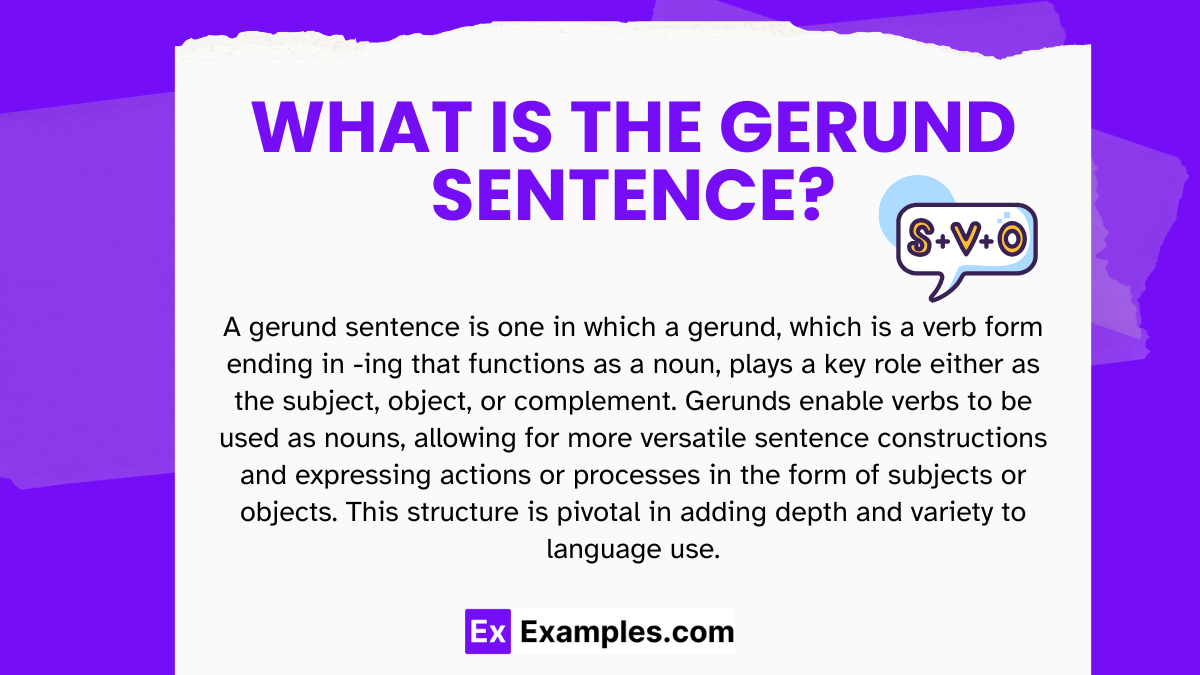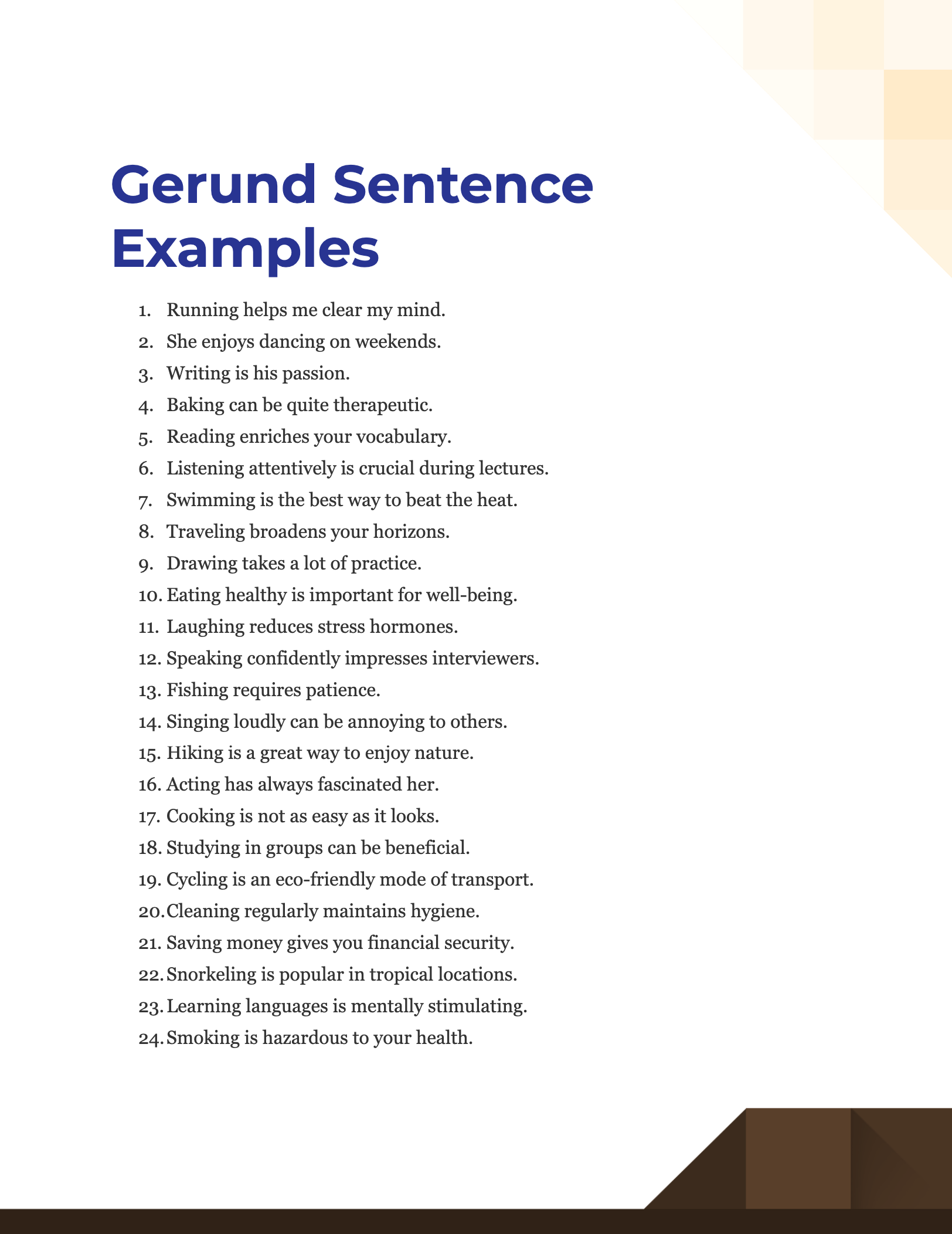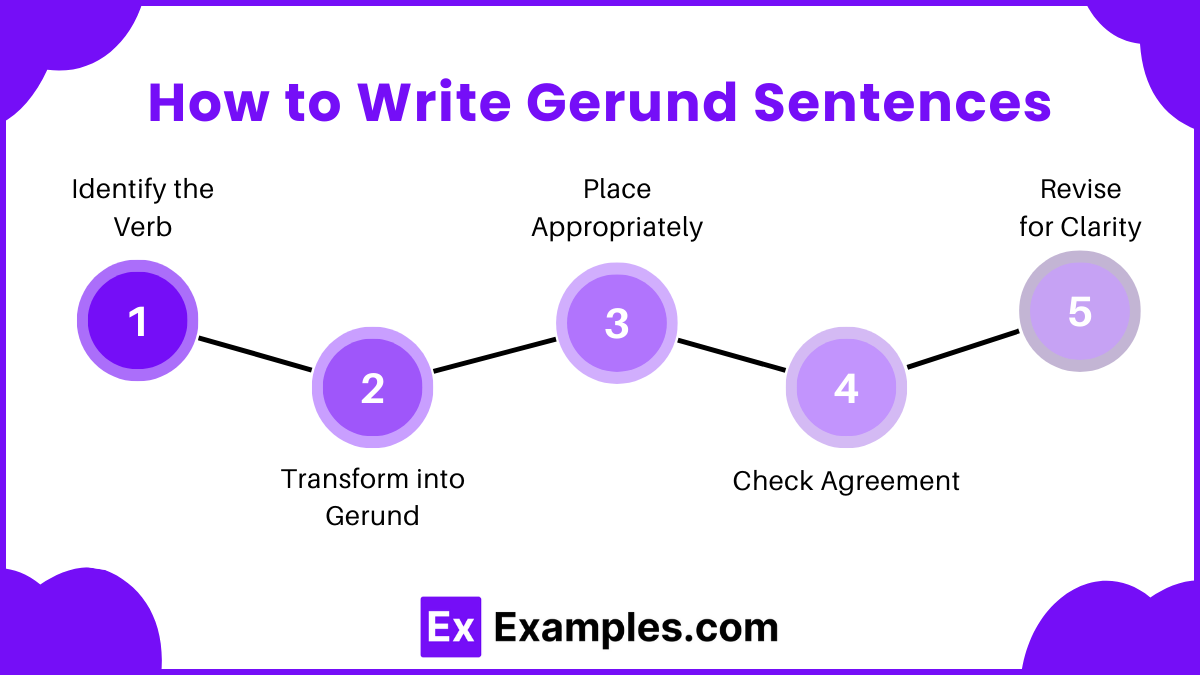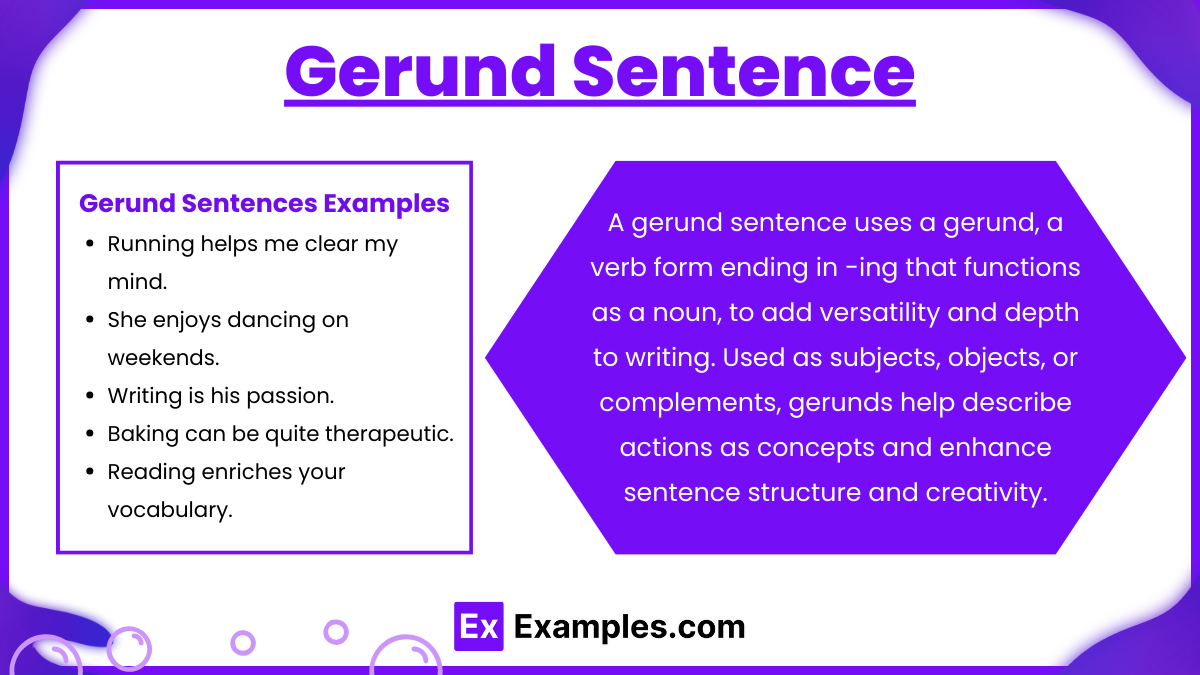99+ Gerund Sentence Examples
Welcome to the world of gerund sentences, where language turns action into noun to add flair and depth to our expressions. These special constructions help breathe life into the written word by transforming everyday verbs into subjects or objects in sentences. From crafting vivid descriptions to structuring thoughtful reflections, gerund sentences open up a realm of creative possibilities. Let’s delve into how these powerful tools shape our communication and why they are essential for effective writing.
What is the Gerund Sentence?

100 Gerund Sentence Usage Examples

Master the art of using gerunds to enrich your sentences with our carefully curated list of 100 unique and distinct examples. This expansive resource covers everything from basic to advanced uses, turning you into a gerund pro in no time. Ideal for students, writers, and anyone looking to refine their English skills, these examples promise to make your writing more engaging and versatile.
- Running helps me clear my mind.
- She enjoys dancing on weekends.
- Writing is his passion.
- Baking can be quite therapeutic.
- Reading enriches your vocabulary.
- Listening attentively is crucial during lectures.
- Swimming is the best way to beat the heat.
- Traveling broadens your horizons.
- Drawing takes a lot of practice.
- Eating healthy is important for well-being.
- Laughing reduces stress hormones.
- Speaking confidently impresses interviewers.
- Fishing requires patience.
- Singing loudly can be annoying to others.
- Hiking is a great way to enjoy nature.
- Acting has always fascinated her.
- Cooking is not as easy as it looks.
- Studying in groups can be beneficial.
- Cycling is an eco-friendly mode of transport.
- Cleaning regularly maintains hygiene.
- Saving money gives you financial security.
- Snorkeling is popular in tropical locations.
- Learning languages is mentally stimulating.
- Smoking is hazardous to your health.
- Shopping online offers convenience.
- Recycling benefits the environment.
- Visiting museums is educational.
- Cheating is unacceptable in any form.
- Borrowing books from the library saves money.
- Painting relaxes my mind.
- Donating to charities is a noble act.
- Texting while driving is dangerous.
- Exercising regularly boosts your immune system.
- Meditating helps in mental clarity.
- Partying all night can be exhausting.
- Dieting without consultation can be harmful.
- Photographing wildlife is challenging.
- Skiing is a thrilling winter sport.
- Kayaking is great for upper body strength.
- Blogging can be a good source of income.
- Surfing requires balance and strength.
- Joking too much may not be appropriate at work.
- Tumbling is a key skill in gymnastics.
- Juicing is a quick way to get nutrients.
- Composting is good for your garden.
- Weeding is essential for plant growth.
- Knitting can be a relaxing hobby.
- Decorating makes your home more personal.
- Winning isn’t everything; it’s the only thing.
- Vlogging is becoming increasingly popular.
- Jumping to conclusions is never good.
- Napping can boost your mood.
- Investing wisely secures your future.
- Quizzing helps in memory retention.
- Trekking is adventurous but tiring.
- Humming can be soothing.
- Throwing tantrums won’t solve problems.
- Lying is unethical.
- Doodling can improve concentration.
- Fasting must be done cautiously.
- Sparring is essential in martial arts.
- Zipping through tasks can lead to mistakes.
- Yelling is not an effective form of communication.
- Queuing is a sign of an organized system.
- Jogging at dawn is refreshing.
- Camping brings you closer to nature.
- Hosting events can be stressful.
- Welding needs protective gear.
- Whistling may irritate people around you.
- Grilling is a popular summer activity.
- Kneading dough takes effort.
- Scrolling endlessly is a waste of time.
- Clapping signifies appreciation.
- Drilling requires focus.
- Mowing the lawn is a Sunday ritual.
- Grooming is important for job interviews.
- Strumming a guitar is therapeutic.
- Stretching before exercise prevents injuries.
- Winking can be misinterpreted.
- Shredding documents maintains privacy.
- Marching is tiring but impactful.
- Buzzing sounds can be annoying.
- Roaming without a purpose is liberating.
- Giggling too much can seem immature.
- Flossing daily is recommended.
- Carving wood is an ancient art form.
- Balancing work and life is crucial.
- Nesting birds are a sign of spring.
- Gliding is smoother than walking.
- Quilting is a communal activity.
- Hovering parents can stress children.
- Rinsing dishes before washing is effective.
- Oiling machinery prolongs its life.
- Blowing bubbles is a simple joy.
- Shaking hands is a form of greeting.
- Dueling was an old form of conflict resolution.
- Tweeting is a form of microblogging.
- Yawning too much can signify boredom.
- Frying should be done at the right temperature.
- Quoting famous people can be inspirational.
Gerund Sentence Examples for Class 5
For Class 5 students, using gerunds can spice up your writing. Understanding gerunds helps in complex sentence formation and adds flair to your language. Dive into these illustrative examples.
- Whistling makes him cheerful.
- Frowning does not solve problems.
- Crying won’t make it better.
- Listening helps you learn.
- Spelling can be difficult.
- Running keeps you fit.
- Writing improves with practice.
- Exploring broadens your horizon.
- Painting is a creative outlet.
- Sewing mends torn fabric.
Gerund Sentence Examples for Class 6
For Class 6 students, the use of gerunds offers a chance to enhance your written and spoken English. As verbs transformed into nouns, gerunds offer variety in sentence creation. Here’s how to utilize them.
- Snorkeling is adventurous.
- Arguing won’t change my mind.
- Flying kites is exhilarating.
- Calculating quickly is a skill.
- Chewing helps in digestion.
- Smiling is contagious.
- Tasting before buying is wise.
- Acting is my passion.
- Harvesting crops is hard work.
- Photographing landscapes is satisfying.
Gerund Sentence Examples for Class 7
For Class 7 students, incorporating gerunds into your English assignments can earn you extra points. Gerunds offer flexibility and sophistication to both writing and speech. Try using them with these examples.
- Sailing requires skill.
- Drumming takes coordination.
- Tackling problems head-on is useful.
- Shouting isn’t polite.
- Hiking is a great workout.
- Gardening connects you with nature.
- Mentoring benefits both parties.
- Researching is key to success.
- Judging others is not fair.
- Fishing requires patience.
Gerund Phrase Sentences Examples
- Baking bread takes patience and practice.
- She enjoys reading mystery novels.
- Jogging in the morning keeps him energized.
- They discussed moving to a new city.
- Learning languages is a useful skill.
- Watching movies is one of her favorite hobbies.
- He avoided talking about his vacation plans.
- Cleaning the house can be very therapeutic.
- I am looking forward to visiting my family.
- Singing loudly in the shower is her guilty pleasure.
Gerund Noun Sentences Examples
Gerund noun sentences feature a gerund, a verb form ending in -ing that acts as a noun within the sentence. This grammatical structure allows for versatile expression, making it possible to turn actions into subjects or objects.
- Swimming regularly improves endurance.
- Writing clearly is essential for effective communication.
- Playing chess develops strategic thinking.
- Traveling around the world opens up new perspectives.
- Dancing can be a great way to express emotions.
- Eating healthy supports overall well-being.
- Skipping meals can lead to health problems.
- Quitting smoking is challenging but beneficial.
- Studying diligently helps achieve academic success.
- Painting helps him relax after a long day.
Gerund Verb Sentences Examples
Here the examples of sentences where gerund verbs are used to express activities or actions as nouns, typically serving as subjects, objects, or complements in the sentences.
- Gardening relaxes me after a long day at work.
- Jogging before breakfast energizes me for the day.
- Solving puzzles is a good way to keep the mind sharp.
- Cooking can be as creative as painting or writing.
- Playing the guitar has become his favorite pastime.
- Reading extensively broadens your perspective.
- Singing in the choir has improved her confidence.
- Traveling has taught them invaluable life lessons.
- Knitting has become a popular hobby again.
- Fishing at dawn is peaceful and rejuvenating.
Gerund Appositive Sentences Examples
Gerund appositives are phrases where a gerund (a verb ending in -ing that functions as a noun) adds descriptive detail to another noun in the sentence, providing more information or clarifying a point.
- His hobby, collecting stamps, has taken him to numerous trade shows.
- One of her daily routines, running five kilometers, helps her clear her mind.
- The task, washing the dishes, is something he oddly enjoys.
- Her favorite pastime, reading historical novels, transports her to different eras.
- My morning ritual, making coffee, is a cherished quiet time.
- His dream, owning a bookstore, might soon become a reality.
- Their plan, renovating the old farmhouse, will take a lot of time and effort.
- Her passion, teaching yoga, has improved her own practice.
- The technique, using oil pastels, allows for vibrant artwork.
- My first job, delivering newspapers, taught me the value of hard work.
Perfect Gerund Sentences Examples
Perfect gerunds involve the use of “having” plus the past participle of a verb, and they express actions that were completed before the time referred to in the main clause.
- He regrets having missed the meeting.
- She mentioned having seen the movie twice.
- They discussed having traveled to Italy last summer.
- Having completed the project on time, we felt relieved.
- I appreciate your having taken the time to explain this.
- His experience of having lived abroad was evident in his language skills.
- We avoided having spoken about the controversial topic.
- She enjoys having learned to play the piano.
- They recalled having met her at the conference.
- I considered having applied for the job a mistake.
Examples of Gerund Words
Gerund words are verbs that have been transformed into nouns by adding “-ing” to the base form. These gerunds can perform various functions in a sentence, such as subjects, direct objects, or objects of prepositions. Below are some common gerund words:
- Reading – Reading is a useful habit.
- Writing – Writing takes a lot of practice.
- Swimming – Swimming is excellent for cardiovascular health.
- Dancing – Dancing is both fun and aerobic.
- Cooking – Cooking requires patience and skill.
- Running – Running helps in burning calories.
- Singing – Singing can be therapeutic.
- Listening – Listening is a vital communication skill.
- Talking – Talking too much can be annoying.
- Eating – Eating too fast is not good for digestion.
- Drinking – Drinking water is essential.
- Jogging – Jogging in the morning is refreshing.
- Smoking – Smoking is detrimental to health.
- Driving – Driving requires focus and attentiveness.
- Climbing – Climbing mountains is adventurous.
These gerund words can fit into sentences in multiple ways, offering flexibility and depth to your English expression. Knowing how to use them appropriately can improve both your written and spoken English.
How to Write Gerund Sentences

- Identify the Verb: Start by choosing a verb that will be transformed into a gerund (verb ending in -ing). This verb should logically function as a noun in your sentence.
- Transform into Gerund: Convert your chosen verb into a gerund by adding -ing to the base form of the verb. Ensure that the gerund logically fits as a noun in the sentence’s structure.
- Place Appropriately: Place the gerund in the sentence where it serves best as a subject, direct object, subject complement, or object of a preposition.
- Check Agreement: Ensure that the gerund phrase agrees with the rest of the sentence in terms of tense and perspective.
- Revise for Clarity: After writing your sentence, review it to ensure that the gerund phrase is clear and adds value to the sentence. Adjust for style and clarity as needed.
Tips for Using Gerund Sentences
- Understand the Role of Gerunds: Recognize that gerunds function as nouns. This means they can act as subjects, objects, or complements in a sentence. For example, in “Swimming is relaxing,” “swimming” works as the subject.
- Avoid Common Mistakes: Be careful not to confuse gerunds with present participles, as both forms look identical. Remember that gerunds act as nouns, while present participles function as adjectives or form part of the continuous verb tenses.
- Use Gerunds after Prepositions: Gerunds are particularly useful following prepositions, making them ideal for expressing actions after prepositions. For example, “After running, he always feels energized.”
- Combine with Possessive Adjectives: When a gerund starts a sentence and a noun or pronoun modifies it, use a possessive adjective to clarify ownership. For instance, “His singing was excellent.”
- Check for Verb Compatibility: Some verbs and phrases are directly followed by gerunds rather than to-infinitives. It’s important to know these preferences to avoid errors. For example, you should say “I enjoy watching movies” rather than “I enjoy to watch movies.”
FAQs
Should a possessive be used with gerunds?
Using possessives with gerunds clarifies who is performing the action, as in “I appreciated his coming.”
Can gerunds follow prepositions?
Gerunds often follow prepositions, perfect for phrases like “after eating.”
Are gerund sentences common in English?
Yes, they are common and useful for expressing ongoing actions as nouns.
How do gerunds differ from infinitives?
Gerunds function as nouns, while infinitives can act as nouns, adjectives, or adverbs
Can gerunds be the subject of a sentence?
Yes, gerunds can serve as subjects. Example: “Running is fun.”



